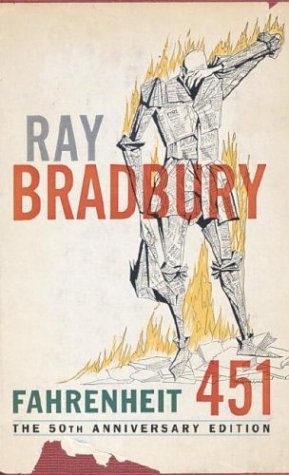 Fahrenheit 451 by Ray Bradbury fits into the juvenile science fiction genre and was first published in 1953. It is recommended for readers ages 14 and up.
Fahrenheit 451 by Ray Bradbury fits into the juvenile science fiction genre and was first published in 1953. It is recommended for readers ages 14 and up.I first read this book when is was assigned in my ninth grade English class and instantly fell in love with it. As an avid reader a book about book burning seems like an odd one to love but it is so well written with so many subplots and interesting ways to analyze it that the possibilities seem endless. I have read it probably five times by now and can never seem to get enough. Guy Montag is the main character. In Montag’s world firemen find people with books, which are illegal, and not only burns those books but their homes as well. On his way home from work one day he meets Clarisse McClellan, a 17 year-old girl who questions everything and who wants to experience the simple things in life that so many forget to notice. This mindset leads Montag to wonder more than he already had about his life and where the world was going. Upon arriving home he finds his wife Mildred has, again, attempted suicide, which has become so common they have men with portable machines that come in to pump her stomach much like a carpet man would come to clean the carpet of a house.
After that Montag begins to act strangely and decides to skip work to read a book that he took from a house they were burning. Unexpectedly his boss Captain Beatty appears at his house and almost catches him. Beatty notices Montag’s change in behavior and tries to set his mind at ease telling him why they burn books. People just didn’t take the time to read anymore. They wanted everything in a shortened version. Which totally reminded me of Cliff Notes and the people who come to my review site who have a test or a report but haven’t read the book but hope to be able to pass by working off what I have done. Beatty also mentioned how the world is more connected and thus there is a bigger group of minorities to deal with than before. People couldn’t write about whatever they wanted to because someone was always getting offended. His final reason was that intellectuals do not currently run the world. Those who were not the brightest in their class tend to feel threatened by the smart kids. By banning books it kept everyone on their level. Beatty gave this speech knowing that Montag had a book hidden and gives him 24 hours to burn they book or they will do it for him.
After Captain Beatty leaves Montag takes out the books he’s hidden over the years and tries to decide which one to burn. Montag then meets with Faber. Faber is an old former lit. professor who wants to rebel but is too scared to do anything. He is shocked when Montag produces a copy of the bible, maybe the last one in that part of the world. Faber then said something that really struck me on page 81 of my copy. Speaking of the bible he said, “They’ve changed it in our ‘parlors’ these days. Christ is one of the ‘family’ now. I often wonder if God recognizes His own son the way we’ve dressed him up, or is it dressed him down?” They have Christ “making veiled references to certain commercial products that every worshiper absolutely needs.” It amazes me how often and how clearly Bradbury saw our day. That was just another example that struck me as right on the money.
Montag ends up going back into work but is shocked when the house they go to burn is his own. Several people called in to report him including his wife. Montag manages to burn his own house but in an argument with Beatty burns him too. Later he realized that Beatty wanted to die but it didn’t ease his conscience about it. Through a series of close encounters Montag manages to escape and eventually finds a group of people who go around memorizing books in the hopes that one day people will want them again and they will write them down so the world can learn from their past.
I know I more or less summarized the entire thing but it’s still worth the read to experience it. It is a truly amazing and inspired book that I have not found it’s equal in the literary world.
No comments:
Post a Comment